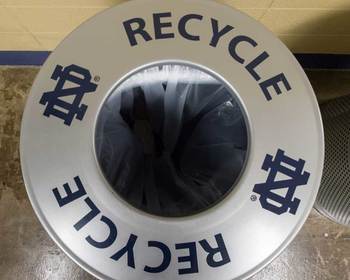Sustainability
Campus Dining strives to meet the ever changing balance between social responsibility, customer preferences, and financial concerns. We continually evaluate these decisions with a dedicated task force who constantly monitor these questions. This group keeps pace with the changing nature of social concerns such as the environment or workers’ rights and is currently investigating and taking action on topics such as local sourcing, sustainability, and employee education.
Recycling & Waste

Campus Dining is a major contributor to the campus recycling program. Each unit participates in ND’s Recycling Irish Program. We contribute glass, plastic, tin, aluminum, cardboard, polystyrene (Styrofoam), newspaper, and paper. We share this responsibility with our customers by making available clearly marked bins for customer waste. Our recycling efforts divert approximately 40% of waste that would go to a landfill, and this number is on the rise. We also salvage equipment for resale. Cooking oil is collected and provided to an oil recycling organization. We actively recycle and reuse office waste using the campus single stream program, resulting in a 75% diversion rate in this area.
Reusable Dishware
Our dining halls and catering department utilize china, silverware, chopsticks, and glass or plastic glasses. Our ware washing procedures minimize water, gas, and electric.
Visit Green ND to learn more about the University of Notre Dame’s recycling efforts.
Sustainably Produced Foods
We actively develop menus in all units to include sustainable choices. We keep current on the list of sustainable choices and actively support organizations such as GAA and the Shedd Aquarium. Campus Dining is focused on offering the choice of sustainably produced food to encourage consumption of products that are renewable and support the environment.
Energy Conservation
Campus Dining purchase energy star products in our new purchases where available. This ensures we are minimizing our water, gas, and electrical use to make the least impact on our environment. Some of these savings include Energy Start rated fryers saving $600 per year and dishwashers saving over $1,000 in energy and water use. New facilities will be designed with a focus on “green” design principles.
Preventive maintenance is regularly performed to ensure equipment is performing at its peak efficiency. Staff members are committed to consolidating and turning off items to conserve resources.
Vegetarian and Vegan Diet
Look for the VGN to find vegan choices of entrees and soups. These items do not contain animal proteins.
Vegetarian diets are one opportunity to benefit in both good health and social responsibility. Vegetables require much less natural resources to grow than animal products.
Notre Dame’s Center for Culinary Excellence (CCE)
Campus Dining operates a central processing facility that provides a cornerstone to our conservation efforts. Bulk production provides economy of scale, conserving costs, utilities, storage, and waste. Vegetable trim goes to a local farm and is used for animal feed.
Our Partners
Campus Dining offers Fair Trade certified coffees in most of our retail areas. North and South Dining Hall feature Direct Trade coffee. We have developed cooperative relationships with the following coffee vendors who focus on human rights: Green Mountain Coffee and Intelligentsia.
Other efforts to ensure social responsibility in coffee service come from Starbucks efforts in coffee procurement and in all facets of their business. Starbucks™ Shared Planet™ represents Starbucks newest initiatives including 13 goals to be achieved in the areas of ethical sourcing, community involvement, and environmental stewardship by the year 2015.
Prime Vendors

Gordon Food Service
We recently moved to a prime vendor, GFS, which limits the number of trucks coming to campus. GFS is also helping us procure more local and sustainable items.

Stanz Food Service
As our main supplier for fresh grown produce, Stanz Food Service has partnered with NDFS and local farmers to obtain produce from area farmers as frequently as possible based on seasonal limitations.
As our main supplier of fine wines, we are proud to partner with E.&J. Gallo Winery and their commitment to sustainability, leading with the Code of Sustainable Wine Growing Practices that are environmentally sound, economically feasible, and socially equitable.
50/50 Give Back Plan is practiced, setting aside one acre of property to protect wildlife for every acre planted as winery. The winery was recognized as the first winery in the United States to achieve International Standards Organization’s ISO 14001 certification.
Campus Dining Partnerships
General Mills
The mission at General Mills is Nourishing Lives. It includes Nourishing Communities around the world by volunteering and giving to worthwhile causes, and Nourishing the Future by helping to preserve and protect the environment for generations to come. They are proud of their progress in all of these areas. We are proud that we partner with them to provide cereals and others products to our campus. General Mills’ 2018 Corporate Social Responsibility report highlights new and long-standing achievements in the areas of health, community and environment.
Freshens
Our partner in Hagerty for smoothies demonstrates their commitment to social responsibility on a regular basis, including a recent addition to the mix the ecotainer™ Paper Cold Cup.
RTI
Because we care about being green at Notre Dame, we've eliminated cardboard and plastic waste associated with traditional oil packaging with automated oil management solutions from Restaurant Technologies. Since December 2016, we avoided 1,256 pounds of trash, the equivalent of 6 dumpsters or 655 cubic feet of landfill space. In addition to reducing our landfill impact, we also recycle 100% of our used cooking oil into biodiesel - we have already recycled over 12, 000 pounds! The efforts of our sustainability initiatives have helped reduce over 32,00 pounds of greenhouse gas emissions which is the equivalent of 2.7 family cars!
UPS
In addition to consolidating loads from our vendors, we utilize UPS for shipping some of our products and their carbon neutral initiatives.
Community Support
We annually support Rebuilding Together, Habitat for Humanity, the United Way, the American Cancer Society, Potowatami Tribe, and many University sponsored charities.Campus Dining demonstrates its commitment to the community by supporting many causes with in-kind donations.
- We donate the cost of food for meals not consumed by students for Wednesday Lunch Fast to the American Hunger Coalition.
- Leftover products which meet food safety requirements are donated to the Center for the Homeless and Hope Rescue Mission through a partnership with Food Rescue US.